Military uprisings and sieges of Constantinople at the end of the XNUMXth century
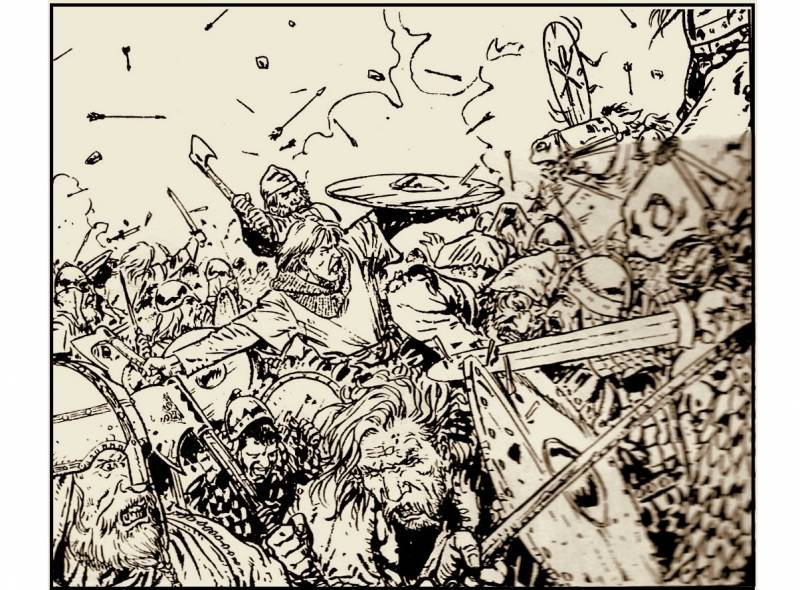
Battle. X-XI centuries Hood. P. Teng.
After the Battle of Manzikert in 1071, nothing seems to have changed. Alive and not in captivity were all the commanders of the Roman Empire. But after the death of the blinded commander-emperor Roman IV Diogenes, it turned out that no one could organize a defense and no one was ready to do it.
But the Seljuk sultan Alp Arslan considered that he owed nothing to the new emperor, unlike Roman Diogenes, and ordered the emirs and beys to launch attacks on Byzantium. And two years later, the Seljuks or detachments of akynzhy (raiders) reached the sea coast. The Turks captured some cities, some passed from hand to hand. Somewhere emirs sat down, somewhere cities fought off Seljuk emirs. Asia Minor has become a battlefield. But the same thing happened on the northern border, where the Pechenegs raged:
While "unable to deal with state affairs", according to the historian Nicephorus Vriennius the Younger, Emperor Michael VII was far from questions of defense and the army, which the state could not allow under the mortal threat:
Simply put, he did nothing until the enemies not only plundered, but occupied entire themes, he hunted and philosophized with Psellos. But in the conditions of Byzantium, this could not continue for a long time. Moreover, the basileus managed to quarrel with his uncle, John, who provided him with power. The uncle went to live and, of course, to hunt in Propontis, and with him his son, an experienced commander and the culprit of the defeat of the Romans at Manzikert, Andronicus, left.
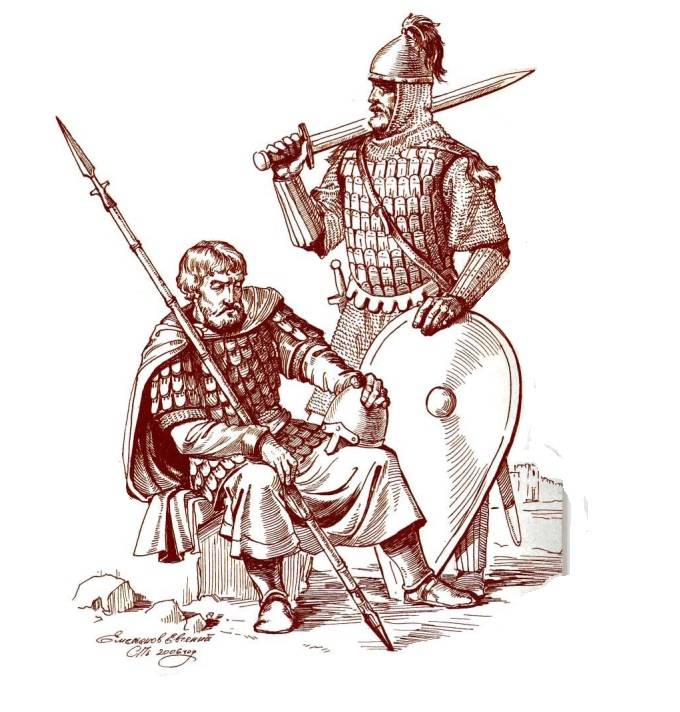
Warriors of the Romans of the XI century. Hood. E. Yu. Emelyanov, V. E. Shikanov
Rise of Roussel de Baioli
And Vasilevs Michael, who had nothing left, returned from exile the supporters of his predecessor Roman Diogenes - the Komnenos family. The king instructed Isaac Comnenus, the dux of the East, to go on a campaign against the Turks. In 1073, he goes along the path already known to us to Cappadocia, where he sets up a camp near Caesarea. And then, taking advantage of the quarrel of undisciplined warriors, the commander of the “Celts”-Normans Russel de Bayoli, aka Rusel or Urzelius, raises a rebellion. He again became the commander of the Normans after the death of Crispin, to whom he was forced to yield it for a while. Now Roussel goes to Sebastius. He is here, where by force, where by persuasion, he subjugates and robs settlements in Lacaonia and Galatia, themes, east of Cappadocia.
Pursuing Roussel, the troops of Isaac and his younger brother Alexei met with the Turks on the border of Cappadocia and were defeated. Isaac was taken prisoner, and Alexei fled, and the Turks, having plundered the lands, went to the east.
Meanwhile, due to palace intrigues, a decision is again made that was beneficial to one and grief for the Roman country. The logothete of the court Nikifor or, as he was called, Nikiforitsa, extorted taxes from the people by any means. And in an attempt to get rid of Caesar and the uncle of the simple-minded king, he offered to send him on a campaign against the rebellious "tyrant" Roussel. At the same time, the king rejected his uncle's proposal to send an experienced commander, his son Andronicus, and put him before a choice: either I will go on a campaign, or you?
By that time, Roussel was already walking towards the capital, found himself on the western border of Cappadocia and eastern Opsikia. Opsiky is a theme that overlooks the coast of the Bosphorus. On the other hand, the royal troops were moving. They met at the head of the river. Sangari at Zomp Bridge in 1073. Sangari crosses Asia Minor from the modern region of Bayat and flows into the Black Sea. It was the boundary between the themes Opsikia and Vukellarii to the north and Cappadocia to the south.
How small the Roman army became, we see in comparison with the detachments of Roussel, who had not only the Normans, Anna Comnena reports that other mercenaries joined him, perhaps also detachments from those themes that he subjugated.
Here is how the troops lined up: John Doukas, "Caesar, a wonderful commander" in the center, at the head of the Varangians and Russ. On the right wing are the mercenaries of the Norman Papos. On the left wing is a domestic schol, possibly with a palace guard, Andronicus. He, as Psellos wrote, "gained military knowledge from manuals on tactics, military leadership and the siege of cities, written by Aelian, Apollodorus and others."
The reserve regiment was led by Nicephorus Votaniat with the Cappodacians, Lycaonians and Alans mercenaries.
The “Celts” changed Papos and went over to Roussel, while Nikephoros Votaniates acted in exactly the same way as Andronicus under Manzikert two years before, withdrew. The center was surrounded, and the fighting Caesar was captured. Andronicus on horseback broke into the line of enemies and cut left and right, was surrounded, and when the enemies tore off his helmet, ready to cut off his head, John covered his wounded son with his body and thereby saved him.
Roussel showed nobility and allowed the wounded Andronicus to be sent to the capital, taking his children hostage. Roussel, realizing that the royal throne did not shine for him, nominated Caesar John to him. And Nikiforitsa, no longer relying on the Roman troops, called ... the Turkish emir, the famous Seljuk commander Artuk or Tutan. He created his huge beylik in eastern Anatolia, on the territory of the themes Mesopotamia and Theodosiopolis. Artuk defeated a small army of the Latins, captured both Caesar and Roussel, releasing both for money. Roussel retreated to Pontus, keeping between Amastris and New Caesarea (Nixar). He again defeated the army of the Alans, led by Nicephorus Palaiologos, recruited against him.
Tsar Michael or his eunuch, sorting through the commanders, now appointed the stratoperdach Alexei Komnenos. Alexei, having practically no troops and finding 150 Alans alive, did the following. Realizing that there were few chances against the “Celts”-Normans in direct combat, it was difficult to resist the blow of the Latin cavalry, he began to use partisan tactics: he captured everyone he could, terrifying those who were sitting in the fortresses. And he attracted the captured into his army.
At this time, the emir, the famous Seljuk commander Artuk (Tutakh), again launched a raid, Russel tries to win him over to his side, and Alexei Komnenos began to persuade the ambassadors of Artuk, referring to the friendship of Sultan Melik Shah and Mikhail VII. The emir succumbed to persuasion and captured Roussel, giving him to Alexei for a large ransom. He in Amasia tried to get money to pay the emir, but the townspeople did not want to give it, he resorted to tricks, pretending to blind the franc, after which he received ransom money. Then he forced all the "Celts" who were left without a leader to go over to the side of the Romans.
While the generals staged riots and fought for power, the beys and emirs seized the lands of Byzantium and founded their possessions: the beylik Saltuk was formed in Theodosiopolis (Erzerum), and the beylik Danishmend-gazi was formed on the territory of Sevastia and Kharsian. At the same time, a certain Suleiman, the son of Kutylmysh, the great-grandson of Seljuk, comes to Cappadocia, which has not yet been captured.
Although among the occupied territories were those that remained under the control of Constantinople, such as Antioch, where Patriarch Aemilian wove intrigues against Constantinople. And Edessa on the Syrian border was captured only in 1086 by the Seljuk Sultan Malik Shah himself.
Toparch Nestor goes to Constantinople
In 1072, a new uprising, caused by tax oppression, arose in Bulgaria. It was headed by Vojtech, and the Serbian prince Bodin took part in it. The Romans crushed him. After that, the logothete Nikiforits, in search of finance, which was really not enough, since Roman IV Diogenes spent a huge amount on his last campaign, stopped making payments to the border cities on the Danube. This happened many times in stories The Byzantines, when suddenly for one reason or another, but more often out of greed, stopped paying the border population.
To appease the rebels in the city of Dristla, the famous city of the times of the campaign of Svyatoslav, Dorostol (modern city of Silistra), the vestarch Nestor, a Slav from Illyria, who made his career under three emperors, was sent. He received the title of toparch of Drist and dux of the theme of Paristrion in 1074. But on the Danube, he was imbued with local ideas among the border freemen, when Nikiforits, as Attaliat writes, considered that Nestor used the allocated gold from the treasury inefficiently and confiscated his house in the capital.
All this led to the fact that Nestor stood at the head of the border freemen, which was joined by a huge number of Pechenegs. This army moved to the capital, plundering Bulgaria, and then Thrace along the way. Adrianople surrendered to the new "tyrant".
Nestor with his exarch Tatush and with the Pechenegs approached the walls of Constantinople, where there were no troops. The townspeople were horrified. The "tyrant" demanded the issuance of a logothete, "as a common enemy and enemy of the world, who made Nestor suffer a lot and confiscated his property, or the removal of Nicephorus from the position of a logothete."
The Romans were able, with the help of bribery, to persuade the Pechenegs to retreat from the city, and the rest of the army followed them. And Vrienny pacified the Bulgarians, about which below.
Later, when the Pechenegs decided in 1078 to conclude an alliance with the Romans under Nicephorus III Votaniates, they slaughtered the Roman rebels before his eyes, among whom Nestor could have been.
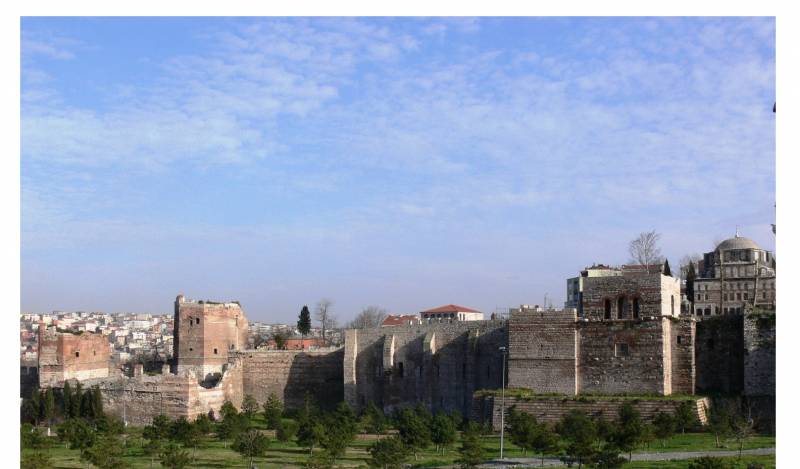
Blachernae. Walls of Constantinople. Modern look outside. Istanbul. Türkiye. Photo of the author.
"Tyrants" in the struggle for Constantinople
Again, the question arose periodically that the Roman state did not really need an emperor who did not know how to fight. Vasilevs Michael needed a warlike co-ruler. Michael VII thought to make the commander Nicephorus Bryennius already known to us as such:
But a relative of the Empress-mother of Michael VII, Konstantin Drungaria, who himself was aiming for the royal place, frightened the timid tsar, telling him: either give him all power, or nothing. Vrienny, confident that he would be Caesar, rumors about this had already circulated, received a turn from the gate, or rather, he was appointed the dux of Bulgaria, the territory on fire, the Pechenegs and the uprisings of the Slavs shook these lands. But Vriennius reassured Bulgaria, then he was transferred to Dyrrhachium (Durres, Albania), the city-key to the Adriatic coast, but here he conquered the Croat and defeated the pirate flotilla Normans.
The intrigues of the logothete-eunuch forced the generals, the brother of Nicephorus Bryennius, John and Nicephorus Vasilaki, known to us from the battle of Manzikert, to enter into a conspiracy. They allegedly urged Nicephorus to wear purple clothes, but he hesitated. Soon the troops, the nobility and the inhabitants of Troyanopol (theme of Strymon, formerly the province of the Rhodopes) proclaimed Nicephorus Bryennios as emperor. From here he moved to Adrianople (Edirne) - the key to Constantinople.
So, the goal of the military was the capital.
The new emperor visited the temple of Our Lady and gathered a military council. He appointed his brother domestic scholia as commander of the regiments that marched towards the capital. And like all the besiegers of Constantinople, he settled down at the Blachernae Palace on the north side.
The townspeople sympathetically reacted to the approaching troops and Nicephorus. And at that time, warriors or their servants began to rob dwellings in this area, more precisely, in the district, which was called Stenos. One group of Russians of Igor in 941, having reached the village of Stenos, burned it, and the soldiers of Vriennia did the same, who, not finding anything in the dwellings, burned them. Thus, making of the townspeople who support the new emperor, his opponents.
At the head of the defense stood the brother of Michael VII Konstantin and Alexei Komnenos, and they did not have troops at all, so they, having armed anyone, put them on the walls, moving everywhere and controlling the situation with their own hands. Alexei, a man made for war, saw that the besiegers were foraging near the sea, that is, near the southern part of the fortress wall. He struck them with a sudden blow, capturing 20 warriors, and thereby cheered up the besieged city. And if the king approved of his actions, then his brother Konstantin was unhappy that he was not involved in such a glorious cause.
Meanwhile, Nicephorus Bryennius understood that the siege took a lot of strength, and there was no opportunity to storm such powerful fortifications. The hope that the townspeople would meet him with open arms failed, and it was impossible to take the city in any other way. And he left under a plausible pretext from the walls, the Pechenegs broke into Thrace. Nicephorus defeated them and concluded an alliance treaty.
And at the same time, the dux of the East, Nicephorus Botaniatus, revolted. He, together with Emir Chrysoskul, who went over to the side of the Romans under Roman Diogenes, begins to subjugate the cities to his power. The emperor and the logothete, not knowing what to do, turned to Suleiman, the great-grandson of Seljuk.
He unites and subjugates the disparate forces of emirs, beys and Oghuz tribes, begins to seize lands from east to west, and an alliance with the emperor was to his advantage. The cities, which under normal conditions regarded him as an enemy, saw Suleiman as an ally of the emperor. He takes Melitene (Malatya), Caesarea (Kayseri), Sevastia (Sivas), Iconium (Konya), the richest city of Anatolia. In 1075, he blocked Nicephorus Votaniat's exits to the coast of Bithynia, but Votaniat tricked his way to Nicaea, where Chrysoskul bribes the vanguard of the Turks, and they give him the opportunity to leave for Nicaea.
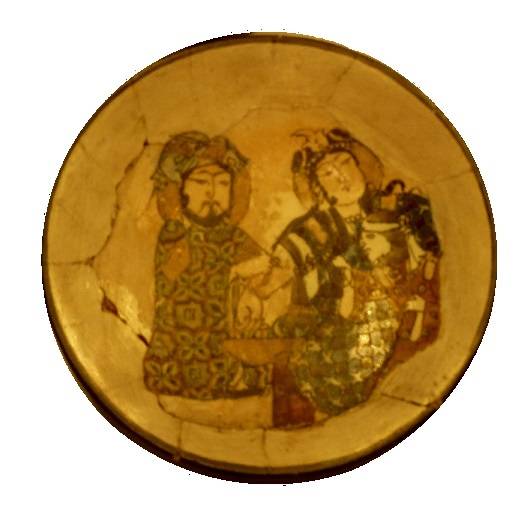
Turks. Picture on a plate. XNUMXth-XNUMXth centuries Museum Island. Berlin. Germany. Photo of the author.
And here he was waiting for a lot of troops. Nikephoros sends gold-sealed chrysovules to the capital to his potential supporters, and they prepare a plot. Caesar John Duka found out about him, who convened a council of the king, the logothete Nikiforitsa and Alexei Komnenos, the latter offered to seize the conspirators. But the basileus insisted on doing all this in the morning, without disturbing anyone at night. And the conspirators, realizing that they had been discovered, released the prisoners from the prisons, armed them, together with their servants, forced by force the officials who did not participate in the conspiracy in favor of Votaniat, all to gather in Hagia Sophia, issuing khrisovul:
The king, having learned about this, summoned Comnenus for advice. Alexei said that the crowd of artisans did not know military affairs, and if the Varangians were sent from the palace, they would quickly disperse it. But the soft-bodied king replied to this proposal that he was not ready to fight and had long planned to retire, making his brother Constantine king. After that, he left the Bukoleon Palace, which was near the center of the uprising and St. Sophia, to the Blachernae Church of Our Lady.
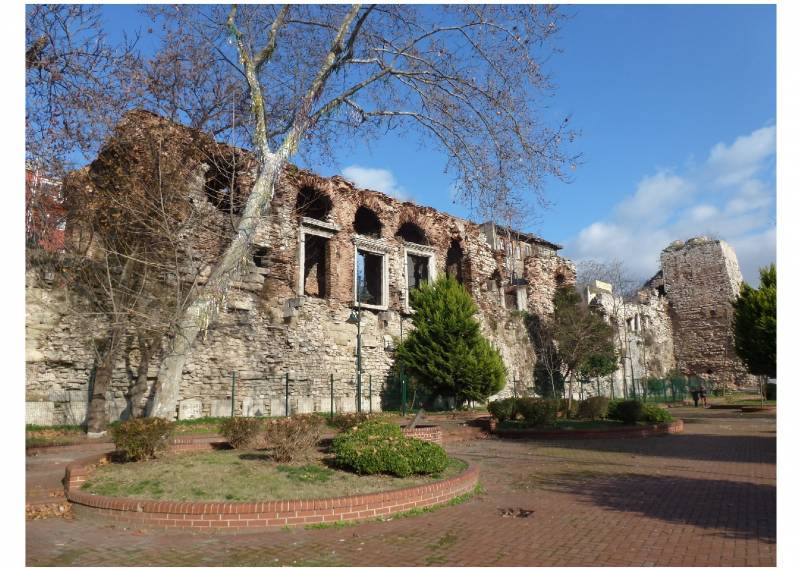
Remains of the Bucoleon Palace. Modern look outside. Istanbul. Türkiye. Photo of the author.
And Votaniat goes to the coast to move to Constantinople, he arrived at the Rufi palace, which was located on the banks of Chalcedon (the Asian side of the Bosporus). He sent a detachment to occupy the royal palace and himself was waiting for the royal dromon, when the brother of the emperor Konstantin Duka, who renounced the throne and, as it turned out later, with him and from his eyes, and Alexei Komnenos arrived to him. They recognized the king in the 76-year-old commander, and nothing remained of his predecessor, except for the well-known name of money - “ducats”.
Thus ended the short struggle for Constantinople.
Meanwhile, Nicephorus Bryennios learned of what had happened and moved towards the capital with his western regiments. Nikephoros Votaniat had no choice but to turn to Suleiman, who occupied Nicaea and was not going to leave it. The newly-minted sultan gave 2 thousand horsemen to help and promised more. In the course of negotiations with Bryennius, the result was not achieved, and Votaniat sent the domestic scholia Alexei Komnenos against him to war. He had a small army, consisting of Normans, Homatians (natives from the Syrian border), a detachment of "immortals". Units created by the previous king and trained for battle. And, of course, the ubiquitous allies of the Turks.
Bryennius had a numerical advantage, he put the Normans on the right flank with horsemen from Thessaly, five thousand soldiers. The left one consisted of warriors of Macedonian and Thracian themes, three thousand soldiers. In the center were riders from the same themes. Even to the left of the left flank were the Pechenegs, who were supposed to go around the enemy’s formation on the left and go to their rear. Alexei Komnenos did not, and indeed could not, wait for the Turks coming to the rescue, those whom the Sultan had promised. He himself led a part of the army, which consisted of immortals and Franks, and entrusted the Homatians and Turks to Constantine Catacalon.
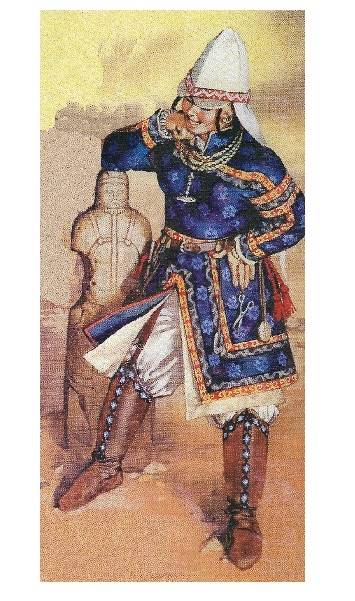
Cookie. Osprey Publishing.
The battle took place at Kalavria in 1078 near Thessalonica.
Using the fact that the area is cut by ravines, and one flank of the enemy does not see the other, he attacked the right flank of John Bryennios with the forces of the immortals, but John counterattacked and put the immortals to flight. Alexei himself, in the heat of battle, and this happened often with him, found himself in the rear of the right flank of the enemy with six companions. His reckless plan to infiltrate the headquarters of Vriennius and kill him was rejected by his companions, offering to break through to their own.
At this moment, the Pechenegs on the left flank, seeing the Khomatins, easily dispersed them. They returned to the convoy of the army of Bryennius, plundered it and rode off, sowing confusion in the ranks of the army. While Komnenos, hiding his face under the feathers of his helmet, grabbed the horse Vrienne from the waggon, brought it to his own and began to shout that he had died, which encouraged his defeated troops. And then the Turks approached, they found Alexei and offered to counterattack, their leaders with Komnenos climbed the hill and surveyed the situation. The nomads constantly sought to inspect the entire battlefield.
And then they noticed that the phalanxes of Nicephorus were in disorder, immediately the Turks were divided into three detachments, two into an ambush, one into an attack for a feigned flight. Among the attackers, one immortal stabbed Nikephoros Bryennius in the chest with a spear, he cut the spear with one blow, and the warrior with another. And then Turkish arrows flew. Nicephorus counterattacked and was ambushed by the first detachment, but brother John came to his aid. They counterattacked again, and then the trap slammed shut, the troops of the failed emperor faltered and fled. Nikifor also fled, courageously resisting, when a horse was killed, he fought on foot until he was exhausted, was captured and honorably taken to Alexei Komnin.
But two more "tyrants", contenders for the throne, in 1079, Nicephorus Vasilaki in Europe and Nicephorus of Milissinsky, the husband of the sister of Alexei Komnenos, fought for the throne in Asia, the latter entered the cities of Asia Minor with the Turks, who now took them away in front of the unlucky emperor yourself. And the Turks of Suleiman and his brother Masur finally entrenched themselves on the shores of the Sea of Marmara and took the coastal territory with the cities of Nicaea (Iznik) and Nicomedia (Izmit). Suleiman sent a message to the Caliph in Baghdad, who gave him the title of Sultan. Thus arose the second Seljuk sultanate, covering the vast territory of the former Byzantine Asia Minor.
The time has come for Alexei Komnenos to take the capital
The defeat of the rebel generals led to political calm, but temporary workers from the close associates of the new aged king fought against everyone who, in their opinion, threatened the power of Nicephorus III Botaniat, who was 1081 years old in 79. Living under the constant threat of being blinded or something worse, despite the highest ancient Roman title of sebaste, Alexei Komnenos decided to rebel, taking as allies the noble Armenian and warrior Bakuriani and the Norman Umbertopul or Constantine Umbert, son of Umbert of Gotville. They called on their side George Palaiologos and warned Caesar John Doukas, as well as Nikephoros Milissin, who himself wanted to put on purple sandals again.
Alexei, having gathered a large army in Thrace, approached the capital, he stood on the hill of Aretes, from which the city was in full view. He didn't have any siege equipment and decided to swoop him down, which was useless. Even taking into account the fact that Emperor Nicephorus Votaniates had practically no troops, it was almost impossible to take the city from a swoop without siege equipment, and even with siege equipment, which we have seen more than once during the sieges of Constantinople. John Doukas decided to bypass the walls to clarify the situation.
The stratiotes on the walls, who recognized him, subjected him to bullying for his tonsure, shouting: "Abba." But John found out what was needed, and informed Komnenos that the Varangians guarding the walls and towers and the immortals from the Anatolic theme, the king's countrymen, would not go to betrayal. You can only talk with the commander of the Germans Gilprakt. Which is what was done. The Germans opened access to the Harisian or Adrianople gates guarded by them, as they were originally called (Edirnekapi). From them you immediately get to the Mesa, the main street of Constantinople, which goes from the gate through the whole city, Philadelphia, the Forum of Constantine to the Million, the pillar from which the countdown of the distance in the empire began.
At night, Alexei lined up the troops and moved to the walls. He sent George Paleologus forward to the German Gilprakt, he occupied the tower, and at dawn opened the gate, into which the soldiers began to enter. It was April 1, 1081, Maundy Thursday. But the army, knowing what wealth the townspeople had, proceeded to robbery with impunity:
Votaniat, not knowing what to do, decided to hand over the crown to Nikephoros Milissina and sent a spafarius (sword-bearer) to him, who was intercepted by George Palaiologos. And the fleet went over to the side of Komnenos. While negotiations were underway that the emperor was ready to adopt Alexei, Caesar John Doukas said that it was too late to talk about this now, the city was taken.
While the servant of the emperor Boril, having gathered the Khomatins and the Varangians, lined them up on the square of Constantine, on which the Mesa overlooks. He thought that he could defeat the troops plundering the city. But the patriarch called for an end to the killing, and the emperor went to St. Sophia to take tonsure. Thus ended his reign.
Alexei, having seized the throne, was terribly worried about the destruction and violence that his troops brought.
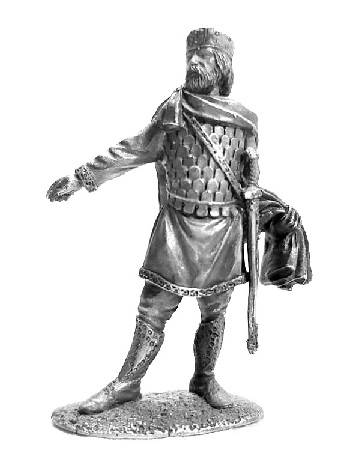
Vasilevs X-XI centuries. Military historical miniature. "Soldiers of Publius"
He rewarded all the participants in the coup, many with newly invented ranks. After which he quickly set out on a campaign, the Normans of Robert Guiscard landed from Italy.
The century was not yet over, and the threats to the capital continued.
To be continued ...
Information